Ocna Mureș
Ocna Mureș (Romanian pronunciation: [ˌokna ˈmureʃ]; Latin: Salinae, Hungarian: Marosújvár, German: Miereschhall) is a town in Alba County, Romania, located in the north-eastern corner of the county, near the Mureș River. The town is situated next to a large deposit of salt, mined in the past until the ceiling of the mines collapsed from water infiltration in 1978. Ocna Mureș has a chlorosodic products plant, a salt extraction plant and a spa which uses the salty water from the former mines.
Ocna Mureș | |
|---|---|
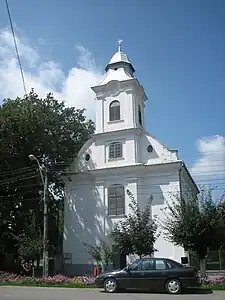 | |
 Coat of arms | |
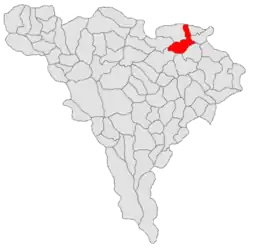 Location in Alba County | |
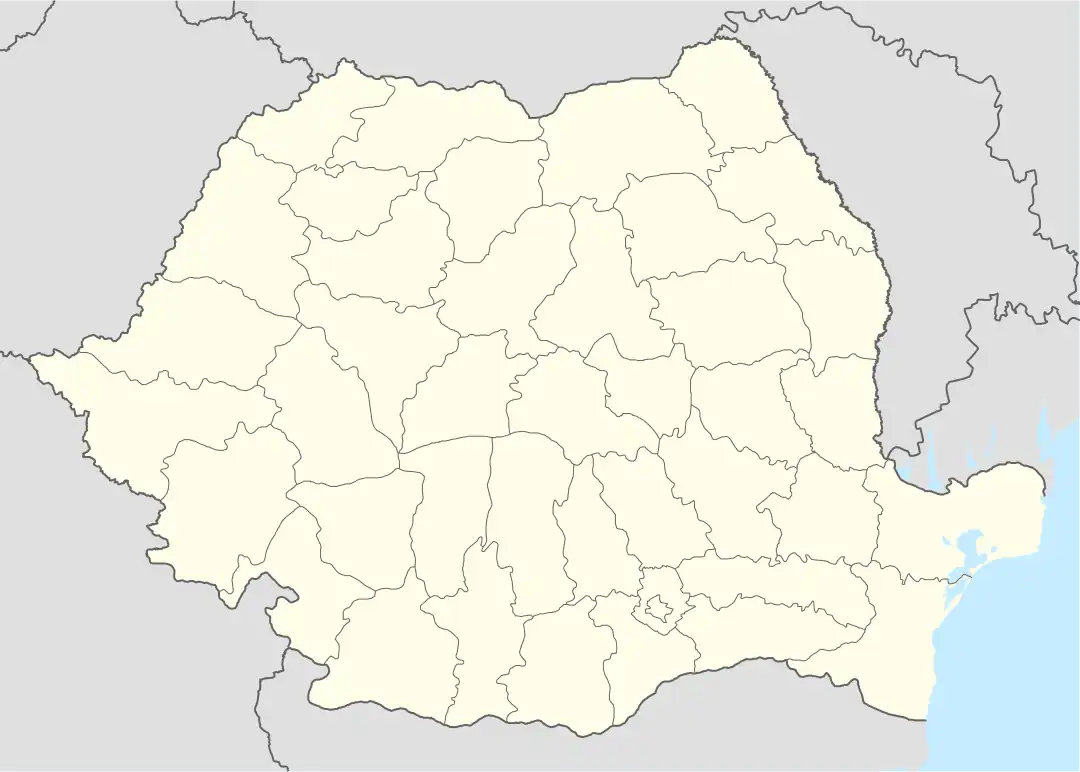 Ocna Mureș Location in Romania | |
| Coordinates: 46°23′24″N 23°51′36″E | |
| Country | Romania |
| County | Alba |
| Government | |
| • Mayor (2020–2024) | Silviu Vințeler[1] (PNL) |
| Area | 68.34 km2 (26.39 sq mi) |
| Elevation | 208 m (682 ft) |
| Population (2021-12-01)[2] | 12,480 |
| • Density | 180/km2 (470/sq mi) |
| Time zone | EET/EEST (UTC+2/+3) |
| Postal code | 515700 |
| Area code | (+40) 02 58 |
| Vehicle reg. | AB |
| Website | www |
The town administers five villages: Cisteiu de Mureș (Magyarcsesztve), Micoșlaca (Miklóslaka), Războieni-Cetate (Székelyföldvár), Uioara de Jos (until 1960 Ciunga; Csongva), and Uioara de Sus (Felsőmarosújvár). Its former name is Uioara, and was called Ocna Mureșului from 1925 to 1956.
The spa is no longer running. The chemical plant in town was lastly purchased by an Indian company from a company based in Timișoara. Currently, the plant has ceased activity. The majority of high school students attend either Liceul Teoretic Petru Maior or the 'Chemistry School,' where many are trained to later work for the factory in town. Exceptional students progress onto university studies, generally in nearby Cluj-Napoca or Alba Iulia, the county capital. The downtown was relocated after the mine was flooded as the ground became unstable. Now this area is filled with more than 4 large, very deep lakes. The center of town is now at the base of a large hill, the 'Banța.'
Demographics
| Year | Pop. | ±% |
|---|---|---|
| 1956 | 10,701 | — |
| 1966 | 12,126 | +13.3% |
| 1977 | 16,416 | +35.4% |
| 1992 | 16,256 | −1.0% |
| 2002 | 15,697 | −3.4% |
| 2011 | 13,036 | −17.0% |
| 2021 | 12,480 | −4.3% |
| Source: Census data | ||
At the 2021 census, Ocna Mureș had a population of 12,480. According to the census from 2011, the town had a total population of 13,036; of those, 83.46% were ethnic Romanians, 9.31% ethnic Hungarians, and 7% ethnic Romani.[3]
Natives
- Ovidiu Maier (born 1971), professional footballer
- Rareș Bogdan (born 1974), journalist and politician
Climate
Ocna Mureș has a humid continental climate (Cfb in the Köppen climate classification).
| Climate data for Ocna Mureș | |||||||||||||
|---|---|---|---|---|---|---|---|---|---|---|---|---|---|
| Month | Jan | Feb | Mar | Apr | May | Jun | Jul | Aug | Sep | Oct | Nov | Dec | Year |
| Average high °C (°F) | 1.8 (35.2) |
4.8 (40.6) |
10.4 (50.7) |
16.4 (61.5) |
21 (70) |
24.3 (75.7) |
26.2 (79.2) |
26.4 (79.5) |
21.3 (70.3) |
15.5 (59.9) |
9.4 (48.9) |
3.2 (37.8) |
15.1 (59.1) |
| Daily mean °C (°F) | −2 (28) |
0.2 (32.4) |
5 (41) |
10.9 (51.6) |
15.9 (60.6) |
19.5 (67.1) |
21.3 (70.3) |
21.3 (70.3) |
16.3 (61.3) |
10.5 (50.9) |
5 (41) |
−0.4 (31.3) |
10.3 (50.5) |
| Average low °C (°F) | −5.4 (22.3) |
−3.7 (25.3) |
−0.2 (31.6) |
5.2 (41.4) |
10.3 (50.5) |
14 (57) |
15.9 (60.6) |
16.2 (61.2) |
11.6 (52.9) |
6.1 (43.0) |
1.5 (34.7) |
−3.3 (26.1) |
5.7 (42.2) |
| Average precipitation mm (inches) | 35 (1.4) |
33 (1.3) |
47 (1.9) |
70 (2.8) |
94 (3.7) |
112 (4.4) |
108 (4.3) |
94 (3.7) |
73 (2.9) |
55 (2.2) |
41 (1.6) |
43 (1.7) |
805 (31.9) |
| Source: https://en.climate-data.org/europe/romania/alba/ocna-mures-15288/ | |||||||||||||
See also
References
- "Results of the 2020 local elections". Central Electoral Bureau. Retrieved 6 June 2021.
- "Populaţia rezidentă după grupa de vârstă, pe județe și municipii, orașe, comune, la 1 decembrie 2021" (XLS). National Institute of Statistics.
- "Structura Etno-demografică a României". Edrc.ro. Retrieved 8 October 2017.
.jpg.webp) Town hall
Town hall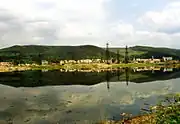 Salt lake and well field (1991)
Salt lake and well field (1991)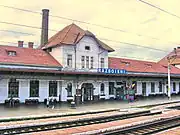 Războieni-Cetate train station
Războieni-Cetate train station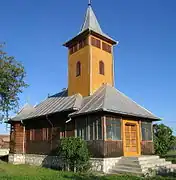 Wooden church in Cisteiu de Mureș
Wooden church in Cisteiu de Mureș
